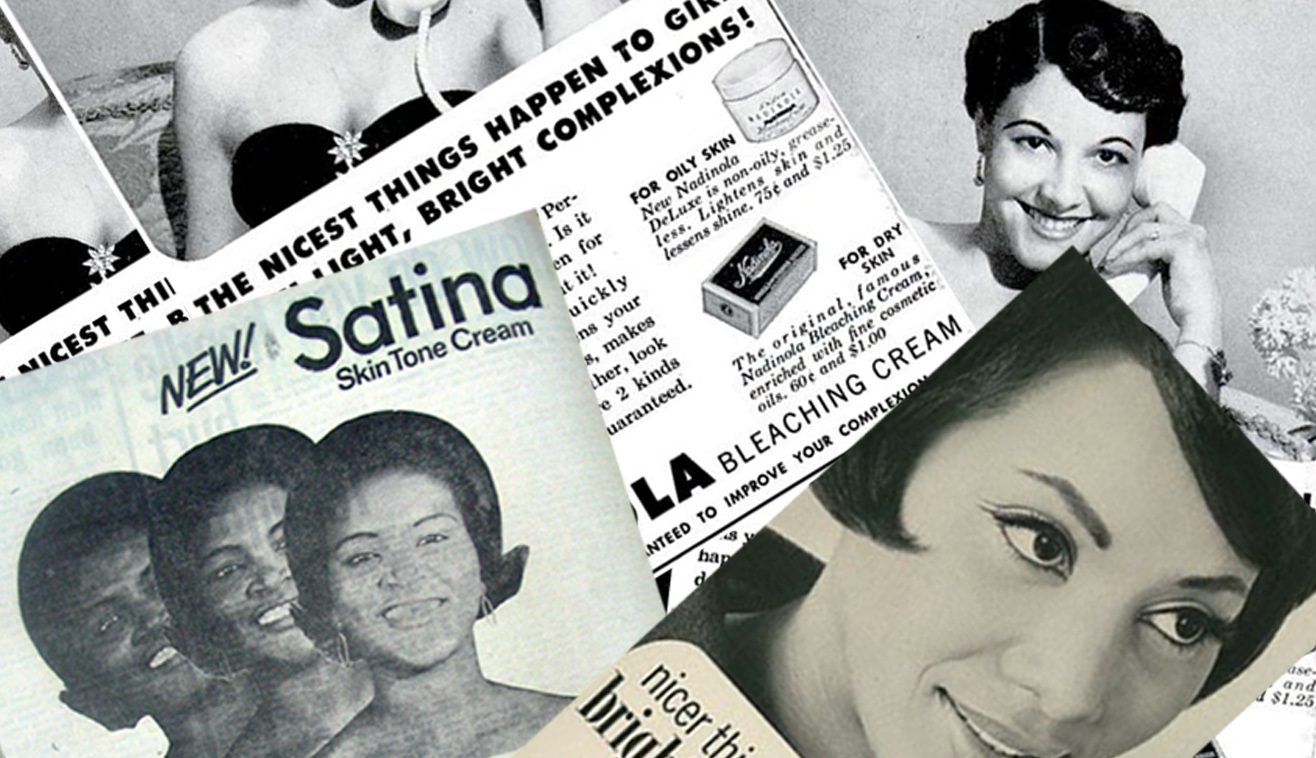The Politics Of Skin Bleaching

On a trip to a hair shop in East London recently to get some hair products, I happened to glance behind the counter where the ‘premium’ products were kept. Along with the salon products were a range of skin lightening creams and that’s the case in many similar shops all over London.
The packaging may have changed, but a look at these vintage adverts show that the message simply has not. They promise light skin, which is ‘beautiful’ simply because of its lightness. It’s a message that hasn’t really updated over the years. We have to ask ourselves why not?
The problem is global. These creams, in ever more high-end forms, are successfully marketed and sold as far afield as China, India and a number of countries in Africa. In 2011, the World Health Organisation estimated that 77% of women in Nigieria were regularly using skin lightening products, while In India, 61% of skin products on the market contained skin lighteners. And my hair shop experience, in London, Britain’s most multicultural city, is hardly remarkable.
A new film out next month, No Shade, created by a London dermatologist, focuses on the underlying issue that drives the popularity of skin lightening creams – colourism. Colourism is discrimination or prejudice against people with darker skin tones from people of the same race.
The fact that large parts of Africa, the Caribbean, China and India buying into the skin lightening industry means that colourism is a huge issue worldwide. The prizing of lighter skin is part of the larger issue of white supremacy and the recognition that the closer one is to whiteness, that the more privilege can attain and the more attractive one is.
This was brought home recently when BBC newsreader Tina Daheley caused a stir tweeting that ‘light skinned privilege is real’, noting her disappointment that the sole black female contestant on ITV’s reality show Love Island was the last to be picked on the show.
But this isn’t just about beauty; light-skinned privilege plays a part in job prospects too. Research shows that darker-skinned men have fewer job opportunities than those with lighter skin.
What are the roots of colourism? In some countries, it’s linked to the effects of colonialism. In India, there is also a traditional caste system at play, in which one’s skin tone is an indicator of where one belongs in society. That China, which was never colonised, also partakes in this hierarchy, shows how pervasive the ‘white western ideal’ is in popular culture.
And just as the issue is global, so are the companies marketing a ‘solution’. The brands that make these products are large international brands like Dove, which prides itself on positive body image campaigning. In London’s Harley Street, rich Africans can afford to get the cutting edge of skin lightening techniques. From small shops in Ghana to London’s Harley Street, skin bleaching cuts across countries and income groups.
What makes the pervasiveness of the problem all the more alarming is that skin lightening carries substantial health risks. The creams often contain high levels of mercury and other chemicals which can cause a range of side-effects such as skin rashes, scarring and discoloration, a reduction in the skin’s resistance to bacterial and fungal infections, kidney damage, depression and anxiety. That’s what prompted the WHO to suggest that skin bleaching must be recognized as an urgent public-health concern.
In light of this, what is the responsibility of the big brands behind the production of these creams? How do we begin to change this?
One way to tackle this is to draw attention to it. The bad news is, most of your faves are problematic. Dove, Nivea, Lancome – a number of big brands are marketing varying degrees of skin lighteners or whiteners. What muddies the water is the fact that the language around skin lightening or whitening is vague, and the regulations vary from country to country. It’s a slippery slope from a product promising to make skin more ‘radiant’ or lightening scars and blemishes to full-on skin whitening.
Campaigns calling out brands like Nivea for the skin whiteners they sell in certain territories challenge the corporate image and may cause enough of a scandal to make them withdraw these products. But it’s not enough to get the products off the market; we need to deal with the underlying mentality. The answer, as so often, lies within. Depriving the brands of their lucrative market will help to stop the spread of these products – and hopefully the damaging mentality of colourism – for good.
Words: Kiri Kanhwende
